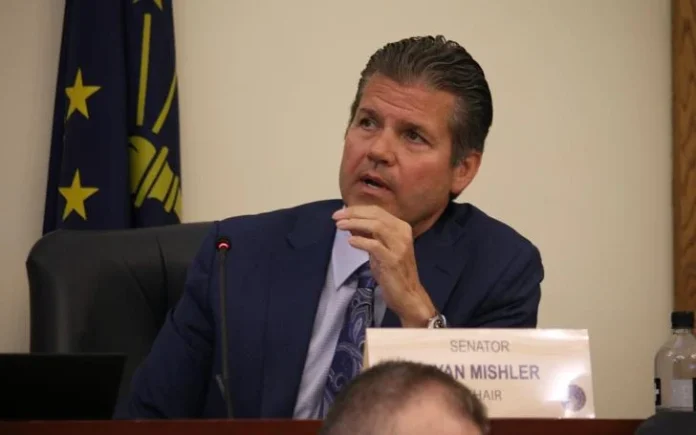State Senators debate $43.3 billion budget proposal before Appropriations Committee
- By Ashlyn Myers, TheStatehouseFile.com
- Apr 16, 2023
INDIANAPOLIS—In the Senate Appropriations Committee on Thursday, Chairman Ryan Mishler, R-Mishawaka, shared his “biggest concern†during the Senate’s state budget unveiling: the level of Medicaid funding surpassing that for K-12.
EducationÂ
In the Senate’s proposed budget, 48% goes toward kindergarten through 12th grade, which is down by a few percentage points from previous years.
In the Senate Appropriations Committee on Thursday, Chairman Ryan Mishler, R-Mishawaka, shared his “biggest concern†during the Senate’s state budget unveiling: the level of Medicaid funding surpassing that for K-12.
Photo by Xain Ballenger, TheStatehouseFile.com.
Differing from thebudget proposed by the House in February, the Senate’s proposed budget does not expand the number of people who could receive vouchers to attend private schools. In the House’s proposed budget, families making up to 400% of free and reduced lunch eligibility would qualify for vouchers, but the Senate aims to keep it at 300%.
The proposal to raise it garnered much frustration from Democrats earlier in the House, who said it was taking funds away from lower-income families who send their children to public schools.
In a House budget meeting two months ago, Rep. Ed Delaney, D-Indianapolis, shared his distaste for the increase.
“This biennial budget creates a vast new voucher entitlement aimed at people with more than decent incomes who are already using private schools. The budget does this at the expense of funds that could be used for public schools and local roads. This budget is the definition of public funds for private purposes,” Delaney said.
The Senate’s budget grants Gov. Eric Holcomb one of his most popular budget requests from back in January—free textbooks—matching the $160 million per year allocation. The budget prohibits schools from charging fees for these items.
For higher education, the Senate proposed allocating $4.4 billion over the next two years. According to Mishler, Ivy Tech Community College will be separate from the formula to fund other universities because its needs tend to be so different from state colleges such as Indiana University or Purdue.
Holcomb’s budget also gave $10 million to Indiana’s only predominantly Black institution of higher learning, Martin University in Indianapolis. Instead, the Senate decided to make a $10 million fund for minority students available for any public or private university that has a physical presence in Indiana.
Health and Safety
In regards to Mishler’s Medicaid concerns, the budget fully funds its forecast at $4.5 billion over the biennium. Mishler said he’s concerned with how the state’s budget portion for K-12 decreases as Medicaid funding continues to grow.
“Everybody wants to expand it [Medicaid] more in their bills,†Mishler said. “And this is the thing that scares me the most: At the rate we’re going, Medicaid will take over, so we have to figure something out. I didn’t think I’d see the day they’d grow faster than K-12.â€
The budget also funds the Governor’s Public Health Commission, as proposed inSenate Bill 4, by $75 million for fiscal year 2024 and $150 million for the fiscal year 2025.
Again matching Holcomb’s budget request, the Senate budget appropriates $1 million per year in new funds for suicide prevention among veterans, and the Indiana State Police will receive salary increases.
Local firefighter training facilities will be funded at $13.1 million in fiscal year 2024.
Economy
To grow Indiana’s economy, the Senate budget proposes $500 million to fund Collaborative Communities, formerly called READI. The budget also gives $10 million over the biennium for the sports and tourism bid fund, which gives Indiana a better chance at hosting large sports events.
Additionally, the proposed budget allocates $5 million in funds for more direct flights per year at Indianapolis International Airport.
All agencies of state government will also receive a salary increase of 12%.
Statewide investments
The proposed budget provides $4 million per year for Clean Water Indiana and also doubles the funds for food banks from $1 million to $2 million.
The budget would also invest in multiple capital upgrades:
- $800 million for a new Westville Correctional Facility
- $253 million toward the Indiana School for the Blind and Visually Impaired
- $100 million for the Potato Creek State Park Inn project
- $97 million for the State Archives building
Overall, during the Senate budget presentation in the Appropriations Committee, several Democrats said they were happy with how Mishler worked with them on hearing their concerns.
Proposed amendments
After Mishler’s presentation, Senate Democrats presented their amendments.
Sen. Fady Qaddoura, D-Indianapolis, proposed Amendments 25 and 30, calling for the budget to allocate more funds for On My Way Pre-K, saying early child development is “a nonpartisan, nonpolitical priority†and that “early childhood education is the key†to Indiana’s success.
Both failed by a vote of 3-9, though Sen. Chris Garten, R-Scottsburg, said he does see the value of pre-k but couldn’t balance the books.
“My no vote will just reflect a math problem with the budget,†Garten said.
Qaddoura’s third amendment, Amendment 18, aimed to eliminate the sales tax on menstrual products.
“Women in our society should not be discriminated against,†he said.
This also failed by a vote of 3-9.
Sen. Eddie Melton, D-Gary, proposed Amendment 31, aiming to raise the cigarette tax by $1.50. He said this was important because the American Lung Association graded Indiana as an F for tobacco education and prevention.
Melton’s bill failed 3-8, although Senators said it would be reconsidered in the future.
In the end, the only Democrat to vote in favor of Senate Bill 1001 was Sen. David Niezgodski, D-South Bend.
Others voted no, saying they may change their opinion while debating the budget on the Senate floor.
The bill will now be discussed by all Senators in the Chamber, and then changes must be agreed upon by the House and Senate by April 29.
FOOTNOTE: Ashlyn Myers is a reporter for TheStatehouseFile.com, a news website powered by Franklin College journalism students.







